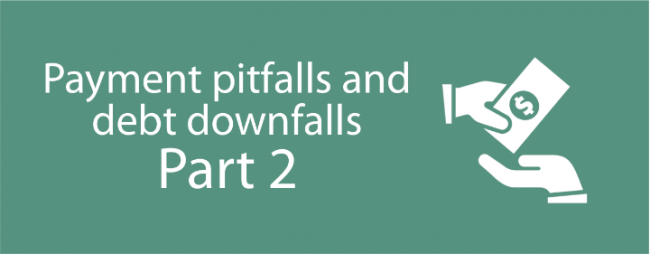Last week we discussed a lack of financial management, signing surety, sudden expenses and worrying about social status. This week we compound on that list with some more points to consider to prevent you from being put in a position that is vulnerable to accumulating debt:
Lacking financial understanding
Formal education doesn’t prepare people well enough for the financial acumen of the ‘real world’. You should know how a budget works, what interest is and the difference between good and bad debt. People often have to learn the hard way, by making mistakes. Clue yourself up if you are unsure about certain terms.
Easy credit
Shops will often try and lure you into opening accounts with them by offering vouchers and discounts with a new card. If you have a stable job and a clean credit record then the amount of credit you can get will most likely be a shock. It is easy to think that you will just use it once.
Reading the fine print
Many people sign papers for a hire purchase because they want their new TV or fridge as soon as possible without realising how much more they will be paying than if they had bought with cash. Not many people know how much of a difference an interest rate of 20% compared to 30% can be. Be wary of people pressuring you into signing documents in a hurry, there might be some small print they don’t want you to see.
Lending money
This scenario depends entirely on the amount that is needed and how good for it you think your friend is. If they haven’t repaid the money they borrowed from you last year then it isn’t a good idea. Sometimes it’s easier to say no than have a strained relationship and debt between friends.
Creating a budget for yourself is one of the best ways to monitor your expenses. Having a budget in place empowers you by letting you know what you can afford now, so that you can have the financial future that you plan for.
Need some financial advice? I can help you out. Let’s get in touch!

